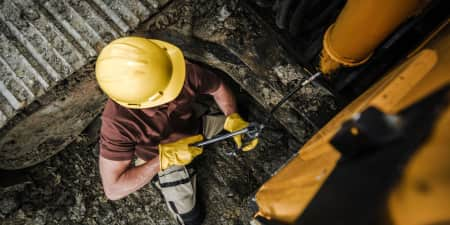Machine Grease 101: The Best Grease Guide Heavy Equipment
While greasing heavy equipment seems to be an equipment operator or mechanic's least favorite part of the job, it is also one of the most important. Ignoring this task can cause unnecessary wear and tear on heavy equipment, leading to more maintenance costs and equipment downtime. It's also less likely that new equipment will be handed over to operators who don't take good care of their machines.
We put together this resource to help equipment operators maintain their heavy equipment. Here, we will go over topics like the best grease for heavy equipment, where to locate grease zerks, nipples, or fittings, how often you should grease, and more.
Why Greasing Heavy Equipment is Important
As mentioned, avoiding using machine grease and lubricant can cause severe issues with the longevity of a machine. This is because grease prevents dirt contamination and wear down of important joints, and keeps pins and bushings healthy for longer periods.
Heavy equipment ownership, maintenance, and insurance are significant costs for many contractors. Anything that helps reduce financial risk should be taken seriously.
However, greasing can be frustrating as it's a tedious and labor-intensive task and can take a while if you're working with unfamiliar equipment. Part of this is because every equipment manufacturer has different grease locations, making it easy for some spots to be forgotten. It also requires cleaning each of the grease nipples before applying new grease, which can be time-consuming depending on the job as dirt build-up can be intense.
Becoming familiar with your machine, reading the manual for where the grease zerks are located, and using battery-powered grease guns can make this job much easier. Using cleaning products like RamRodz can help you clean those hard-to-reach grease nipples better than a common rag.
so much time and effort.
Frequently Asked Questions About Grease
What is the best grease for my skid steer and other equipment?
The best grease for your heavy equipment will be the type suggested in the operation manual. However, most construction equipment requires at least an NLGI #2 type of grease.
It's important to note that different locations on a machine might require a different grease type. It all depends on the operating temperature of that joint.
Some machines now come with an auto-lubrication system which would require lighter, less thick grease like an NLGI #1 or #0.
What are the grease points on excavators and other heavy machinery?
Excavator grease points, as well as on any other heavy equipment, are wherever there are zerk fittings, nipples, or loader pins. These zerks will be anywhere that has hinge points on the equipment. Typically, the majority of them will be found on the boom, lift, and attachments.
Operation manuals will often show you areas where grease fittings are located but won't pinpoint every single one so some searching may be required. It will also vary from manufacturer to manufacturer, but once you understand where they are, that knowledge should transfer over from machine to machine.
How often should I grease heavy equipment?
Greasing heaving equipment is often considered a daily maintenance task for many equipment operators along with fueling and locking up the machines. However, not everywhere is required to be greased every day. Information will be in the operation manual about where to grease and how often. Skipping greasing schedules can be detrimental to the performance of the machine as the wear on pins and bushings will cause failure in performance.
While there is no exact science about the best schedule to grease, it's better to be safe than sorry. You should be doing a walkaround of the equipment every time you get out of the machine to check tires, hoses, cylinders, attachments, and grease levels. Once you hear grinding on the machine, you'll know it is too late and is causing damage to the equipment.
Can you over-grease your heavy equipment?
The short answer is yes but the longer answer is it's better to over-grease than under-grease. If you do over-grease, just make sure to wipe down any excess grease that might be showing so no dirt is collected.
A best practice is to give two or three pumps per grease zerk or until you see the grease come out of the machine slightly.
Should I be removing old grease?
Yes! Cleaning the joint of any old, dirty grease before you apply new grease is very important. However, if done with the correct schedule, this should be very easy to do as it would only have been applied recently.
Are synthetic greases better than non-synthetic?
While the kind of grease you use doesn't always matter, synthetic greases typically last longer and can perform better than multipurpose (polyurea) or moly greases. However, synthetic types are a lot more expensive. Most contractors use multipurpose or moly greases.
At the end of the day, using the grease suggested in the service and operator manual will be the best one to use. The best synthetic grease for heavy equipment is typically any NLGI #2 or #1, depending on the weather.
Do seasons and weather impact the type of grease I should use?
Yes, the weather does affect the grease type you should use. When temperatures increase, grease becomes thinner so you'll want to use a thicker, NGLI #2 type grease. This is especially important in places like Florida, Nevada, California, and Arizona where the temperature can be incredibly hot in the summer.
For colder environments or temperatures below 60 degrees Fahrenheit (16 degrees Celsius), an NLGI #1 grease will be the type you want to use. Marine grease will be your best bet if you're working in a wet or damp environment as it helps protect the machine from rust and salt damage.

